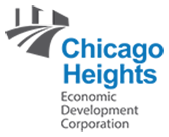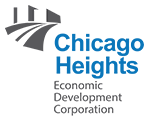TAX INCENTIVES
Enterprise Incentives
Economic Development for a Growing Economy Tax Credit Program (EDGE)
The EDGE program provides an incentive to businesses to support job creation, capital investment and improve the standard of living for all Illinois residents. The non-refundable corporate income tax credit is calculated as a percentage (not to exceed 100%) of the expected income tax withholdings of new job created in the state. Tax credits are available to qualifying companies, equal to the amount of state income taxes withheld from the salaries of employees in newly created jobs. Non-refundable credits can be used against corporate income taxes to be paid.
South Suburban Region of Metropolitan Chicago Enterprise Zone Resource Guide
Chicago Heights has always been proactive about helping its businesses take advantage of the wide range of local and state financial incentives and tax abatement programs. In fact, businesses have historically paid real estate taxes at or below neighboring communities due to the city’s creative approach. Some of these beneficial programs have been highlighted below.
Class 6b
The Class 6b classification is designed to encourage industrial development throughout Cook County by offering a real estate tax incentive for the development of new industrial facilities, the rehabilitation of existing industrial structures, and the industrial reutilization of abandoned buildings. The goal of Class 6b is to attract new industry, stimulate expansion and retention of existing industry and increase employment opportunities.
Under the incentive provided by Class 6b, qualifying industrial real estate would be eligible for the Class 6b level of assessment from the date that new construction or substantial rehabilitation is completed and initially assessed or, in the case of abandoned property, from the date of substantial re-occupancy. Properties receiving Class 6b will be assessed at 10% of market value for the first 10 years, 15% in the 11th year and 20% in the 12th year. This constitutes a substantial reduction in the level of assessment and results in significant tax savings. In the absence of this incentive, industrial real estate would normally be assessed at 25% of its market value.
Class 8
The Class 8 real estate tax incentive established by the Cook County Real Property Assessment Classification Ordinance (“Ordinance”) is designed to encourage industrial and commercial development in areas of the County which are experiencing severe economic stagnation. Class 8 is structured to permit the Assessor, upon application of the local governing body, to certify that such areas are in need of substantial revitalization. In addition, pursuant to an amendment to the Classification Ordinance, property located in any of the five townships: Bloom, Bremen, Calumet, Rich and Thornton or any property obtained through the Cook County Tax Reactivation Project is eligible for Class 8 without any application from the local governing body for certification of an area. Within an eligible certified Class 8 area (the “Subject Area”), all subsequent new construction, substantial rehabilitation or reutilization of abandoned buildings, developed or reoccupied for industrial or commercial use, may qualify for the Class 8 incentive. Prior to undertaking development activities in the subject area, property owner or developer must make application to the Assessor. A processing fee equal to 1% of the Cook County Assessor’s market value (as reflected on tax bills) shall be paid to the City of Chicago Heights by the applicant for new applications and 5% processing fee for renewals.
This incentive assesses qualifying real estate at a reduced assessment level for a period of twelve years from the date that new construction or substantial rehabilitation is completed and initially reassessed or, in the case of abandoned property, from the date of substantial reoccupation. Class 8 assessment levels are ten percent (10%) of market value for ten years, fifteen percent (15%) in year eleven and twenty percent (20%) in year twelve. This constitutes a substantial reduction from the twenty-five percent (25%) at which industrial and commercial properties are commonly assessed. The incentive may be renewed.
Class C
The Class C classification is designed to encourage industrial and commercial development throughout Cook County by offering a real estate tax incentive for the remediation of contaminated properties including abandoned property or vacant land. Such remediation will improve the health and safety of the County’s residents and may result in an increase of the County’s tax base and employment opportunities.
Under the incentive provided by Class C, industrial and commercial real estate would be eligible to apply for the Class C level of assessment from the date of receipt of a “No Further Remediation Letter” confirming achievement of remediation objectives based on the industrial or commercial use. The incentive level of assessment of qualifying properties extends to both the land and other structures in their entirety. To qualify for the Class C classification, an application must be made within one year of the receipt of the “No Further Remediation Letter.” Industrial and commercial properties receiving the initial Class C will be assessed at 10% of market value for the first 10 years, 15% in the 11th year and 20% in the 12th year. For industrial property, the incentive may be renewed during the last year a property is entitled to a 10% assessment level up until expiration of the incentive. The incentive constitutes a substantial reduction in the level of assessment and results in significant tax savings. In the absence of this incentive, industrial and commercial real estate would normally be assessed at 25% and 25% of their market value, respectively.
Tax Increment Financing (TIF)
TIFs are a special tool that a city can use to generate money for economic development in a specific geographic area. TIFs allow a city to re-invest all new property tax dollars in the neighborhood from which they came for a 23-year period. These “new” revenues arise if new development takes place in the TIF district, or if the value of existing properties rises, resulting in higher tax bills. These funds can be spent on public works projects or given as subsidies to encourage private development. With consistent community participation, TIFs can be a tool for implementing a community-based revitalization plan through encouraging affordable housing development, improving parks and schools, fixing basic infrastructure, putting vacant land to productive use, creating well-paying jobs, and meeting other local needs.
Several properties within Chicago Heights are located within TIF Districts, and the City of Chicago Heights will always consider new TIF opportunities for the right projects.
Enterprise Zone
Much of the City of Chicago Heights is located within an enterprise zone. The enterprise zone provides a number of incentives, including the following:
>> 6.25% sales tax exemption on building materials or manufacturing and assembly processing equipment (when the investment exceeds $5 million in property that creates 200 full-time jobs)
>> State utility tax exemption on gas, electricity and telecommunication
>> State investment tax credit of 0.5% that may be carried forward for up to 5 years
>> The ability for businesses to deduct double the value of a cash or in-kind contribution to an approved project from taxable income
Opportunity Zone
Qualified Opportunity Zones are created to stimulate long-term investment in distressed communities.
A Qualified Opportunity Fund generally is an investment vehicle, organized as a corporation or partnership, that invests at least 90% of its assets in “qualified opportunity zone business property”. Taxpayers with Realized Gains can roll those gains into a QOF as long as certain requirements are met.
>> Investors are entitled to a temporary deferral of tax on realized capital gains (“Realized Gains”) to the extent the Realized Gains are reinvested in a QOF within 180 days of the realization event (e.g. sale of stock),
>> Investors are entitled to a reduction of tax on Realized Gains on a sliding scale, depending on how long their investment in the QOF is held, and
>> Investors will not be taxed on any gains earned by their investment in the QOF (“QOF Gains”) if the investment is held for more than 10 years
The investor’s tax basis in the Realized Gains may be stepped up 10% for five years; 15% if the investor holds its investment for seven years; and if the investor holds its investment for 10 years or more, the tax basis is increased to 100% so that no QOF Gains would be taxed.
For additional information, please contact the Chicago Heights Economic Development team.
About Us
The Chicago Heights Economic Development Corporation is dedicated to fostering the creation of new businesses and the retention and expansion of existing businesses to stimulate economic growth in Chicago Heights.
Copyright © Chicago Heights Economic Development Corporation

